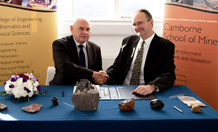
Professor Denis Peach,Chief Scientist British Geological Survey (left) with Professor Nick Talbot
University and Geological Survey join together in a critical alliance
In response to growing unease over supply of critical metals for high-tech manufacturing and green technologies, the British Geological Survey (BGS) and the University of Exeter have agreed to join forces in a new initiative to improve research capability in this vital area.
The ‘Critical Metals Alliance’ agreement signed on 13 December 2011 consolidates long-term links between the British Geological Survey and the University of Exeter/ Camborne School of Mines (CSM). The collaboration is intended to improve the research capability of both organisations to address growing concerns in the UK and Europe over security of supply of critical metals. The research will build on existing complementary skills and expertise in the geology of rare earths, the platinum group elements and other elements including niobium, tantalum, tungsten and indium. It will help to find new ore deposits and utilise those that already exist in a more resource efficient and environmentally friendly way.
“The processes responsible for the formation of many critical metal deposits are poorly understood” says Andrew Bloodworth, Head of Minerals and Waste at the BGS “Both organisations have already made a strong commitment to joint research on this topic through a PhD studentship investigating rare earth mineralisation in Malawi which began earlier this year”.
At the heart of the new alliance is a BGS-sponsored research post based at CSM in Falmouth. Head of Camborne School of Mines, Professor Frances Wall says “We are delighted to welcome Dr Kathryn Moore as our BGS Lecturer in Critical and Green Technology Metals. From March 2012, Kate will lead a research team drawn from both organisations who will work to improve understanding of the geological origins of these important raw materials.”
Date: 14 December 2011
